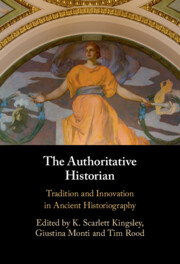Book contents
- The Authoritative Historian
- The Authoritative Historian
- Copyright page
- Dedication
- Contents
- Contributors
- Preface
- Abbreviations
- Introduction
- Part I Myth, Fiction, and the Historian’s Authority
- Part II Dislocating Authority in Herodotus’ Histories
- Part III Performing Collective and Personal Authority
- Chapter 9 Singing and Dancing Pindar’s Authority
- Chapter 10 Authority, Experience, and the Vicarious Traveller in Herodotus’ Histories
- Chapter 11 Veni, vidi, vici
- Chapter 12 Self-Praise and Self-Presentation in Plutarch
- Part IV Generic Transformations
- Part V Innovation within Tradition
- Bibliography
- Index Locorum
- General Index
Chapter 11 - Veni, vidi, vici
When Did Roman Republican Politicians Use the First-Person Singular?
from Part III - Performing Collective and Personal Authority
Published online by Cambridge University Press: 02 December 2022
- The Authoritative Historian
- The Authoritative Historian
- Copyright page
- Dedication
- Contents
- Contributors
- Preface
- Abbreviations
- Introduction
- Part I Myth, Fiction, and the Historian’s Authority
- Part II Dislocating Authority in Herodotus’ Histories
- Part III Performing Collective and Personal Authority
- Chapter 9 Singing and Dancing Pindar’s Authority
- Chapter 10 Authority, Experience, and the Vicarious Traveller in Herodotus’ Histories
- Chapter 11 Veni, vidi, vici
- Chapter 12 Self-Praise and Self-Presentation in Plutarch
- Part IV Generic Transformations
- Part V Innovation within Tradition
- Bibliography
- Index Locorum
- General Index
Summary
This essay grows out of an ongoing interest in the first autobiographies written in Latin, the remains of which date to the early first century BC.2 We have only small surviving fragments of the memoirs composed by four leading Roman senators in the 90s, 80s, and 70s BC. They are Quintus Lutatius Catulus (cos. 102), Marcus Aemilius Scaurus (cos. 115), Lucius Cornelius Sulla Felix (cos. 88, 80), and Publius Rutilius Rufus (cos. 105).3 These men seem to have been the first Romans to write about their own lives in the first-person singular.4 Their writings were circulated either in their own lifetimes or immediately after their deaths. They knew each other and were linked by complex networks of competition, mutual influence, and enmities sharpened by a harsh environment of political disintegration and civil war. In other words, this little group represents an intellectual milieu of sorts, operating at a rather specific time of political and military crisis.
- Type
- Chapter
- Information
- The Authoritative HistorianTradition and Innovation in Ancient Historiography, pp. 224 - 240Publisher: Cambridge University PressPrint publication year: 2023

